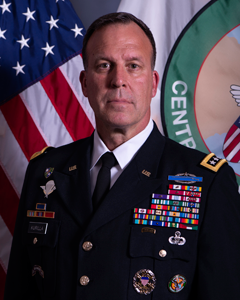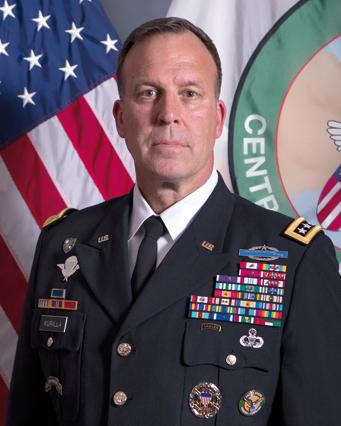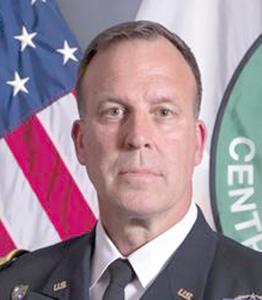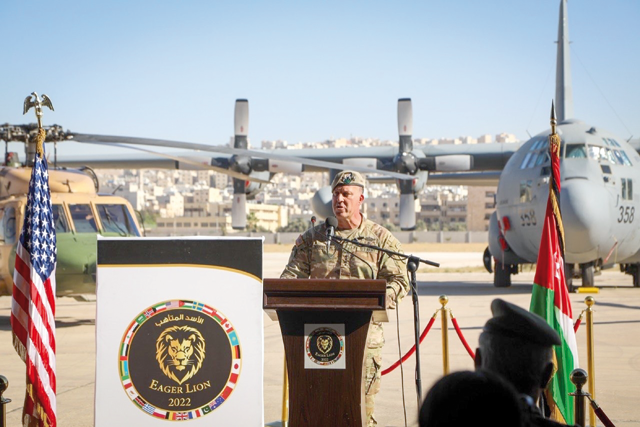You are here
Al Hol camp’s children at risk of Daesh indoctrination, warns CENTCOM chief
By Mohammad Ghazal - Apr 27,2023 - Last updated at Apr 27,2023

Gen. Michael Kurilla
- Camp ‘a flashpoint of human suffering’ , says Gen. Kurilla
- Jordan a ‘bulwark’ for regional peace, stability
- Iran ‘primary destabilising force in region’ — CENTCOM chief
AMMAN — Northeastern Syria’s Al Hol camp, populated by over 51,000 residents, 90 per cent of whom are women and children, has become “a flashpoint of human suffering”, said head of US Central Command (CENTCOM) General Michael Kurilla.
The camp is populated by individuals who fled after Kurdish-led forces, backed by a US-led coalition, cleared the area of Daesh extremists in 2019.
In an exclusive interview with The Jordan Times, General Kurilla expressed his concern over the possibility of Daesh indoctrination for the camp’s 30,000 children. Since taking command of CENTCOM over one year ago, Kurilla has visited the camp four times.
“This month, during my fourth visit to Al Hol camp since taking command, I saw first-hand that these children are prime targets for ISIS [Daesh] radicalisation. There is no military solution to this problem — our long-term goal must be the successful repatriation, rehabilitation and reintegration of the camp residents back into their country of origin,” the general said.
Kurilla stressed that terrorist organisations threaten the region not only due to their radical ideology, but because of external coordination and operational planning with affiliates outside of the Syrian borders.
Jordan: ‘Bulwark’ for regional peace, stability
The general also stressed that Jordan is critical to security and stability in the region, made clear during the battle against Daesh beginning in 2015.
“Under the leadership of His Majesty King Abdullah II, the Jordanian Armed Forces continues to serve as a reliable strategic partner and a bulwark for regional peace and stability,” Kurilla said.
Elaborating on the strategic Jordan-US partnership, the general described his country’s commitment to Jordan’s security and prosperity as “ironclad”.
“Jordan is a close friend and an essential strategic partner on a wide range of shared issues and regional challenges,” he added.
Describing the relationship between the two countries as “strong”, Kurilla noted that the US recognises the Jordan Armed Forces – Arab Army as “a leader in regional security”.
“The Kingdom has an unmatched ability to engage stakeholders from different cultures and points of view, leading the way in responsibility for the enduring defeat of ISIS, peace initiatives, border security and defence cooperation and modernisation,” he said.
Due to JAF’s strong capabilities, the Kingdom continues to be “an exceptionally reliable partner and champion of regional peace and stability”, Kurilla added.
“This week in Amman, I met with Chairman of the Joint Chiefs of Staff of the Jordanian Armed Forces Major General Youssef Huneiti. We discussed many matters of importance to both of our Nations and sought ways to improve our partnership. I have a great relationship with General Huneiti. This is a relationship built on trust and respect, one that serves as a benefit to the region.”
The general stressed his intention to continue, in partnership with JAF, targeting terrorist groups operating in the region through sharing information and conducting training exercises with a specific focus on anti-terrorism.
Much of the Jordanian-US anti-terrorism efforts occur in the arena of law enforcement, Kurilla noted, adding that since 1987,
US anti-terrorism assistance programmes have provided advanced law enforcement and counterterrorism training to more than 7,300 Jordanian law enforcement officials.
Detailing the assistance, Kurilla said that these programmes include training in tactical operations, cybercrimes, explosive detection, violent crimes, investigative techniques, tactical medicine, forensics and train-the-trainer programmes for Jordanian instructors.
In addition to the assistance delivered directly to Jordanian security forces, Jordan and the United States jointly host 76 partner nations and deliver approximately 70 training events each year to build regional capacity, the general said.
“I strongly believe in strengthening relationships; interpersonal engagements are important to me,” Kurilla said. “In this part of the world, relationships matter. The United States and the Hashemite Kingdom of Jordan will need to draw on this relationship into the future.”
Innovation is the key to moving the bilateral relationship forward, Kurilla said, citing “many” opportunities for the Jordan-US relationship to evolve in the coming months and years.
The general stressed the need for the integration of innovative technologies into existing military capabilities. “Particularly, implementation of new technology into areas such as integrated air and missile defence, maritime domain awareness, and defensive cyber represent areas in which we can collaborate on behalf of the security of the Hashemite Kingdom and of the region,” he said.
Deterring Iran
“Iran poses the most ominous threat to the central region,” and “violent extremist groups serve as the most immediate danger to security and stability”, Kurilla said, adding that the US, alongside partner forces, continues to “put pressure” on these groups.
The general named Iran as “the primary destabilising force in the region”, citing various “malign activities” such as threats to US forces, partners and neighbours, support to violent proxy groups that spread chaos and instability throughout the region, support to Russia’s war in Ukraine and Tehran’s continued enrichment and stockpile uranium far above what is needed for commercial use.
“Deterring Iran requires an international effort and a whole-of-government solution inclusive of diplomatic engagement,” Kurilla noted, adding that his country, along with Jordan and other militaries within the Middle East, are mutually concerned with countering Iran’s proliferation of Advanced Conventional Weapons and its support to proxies.
To increase the ability to detect, defend and respond to Iranian military capabilities, the general also stressed the need for continued investment in technology, including Artificial Intelligence and machine learning platforms and programmes.
CENTOM’s deterrence strategy also includes intense focus on building partnerships, as to “continue to build interoperability with allies and partners to deter Iran”, Kurilla added.
Related Articles
AMMAN — An international effort and a whole-of-government approach that is inclusive of diplomatic engagement is required to contain Iran, which is the primary destabilising element in the Middle East, according to Commander of US Central Command (CENTCOM) General Michael “Erik” Kurilla. The US, Jordan, and militaries within the Middle East certainly have a shared interest in countering Iran’s proliferation of advanced conventional weapons and its support to proxies as Iran’s rapidly expanding military capabilities enable it to coerce its neighbours, threaten international trade, and exploit instability throughout the region, he said.
AMMAN — United States Central Command (CENTCOM) Commander General Michael Kurilla has described Jordan as a “reliable strategic partner and
AMMAN — Countries need to step up and do their job by identifying their citizens in order to repatriate, rehabilitate and re-ingrate t














